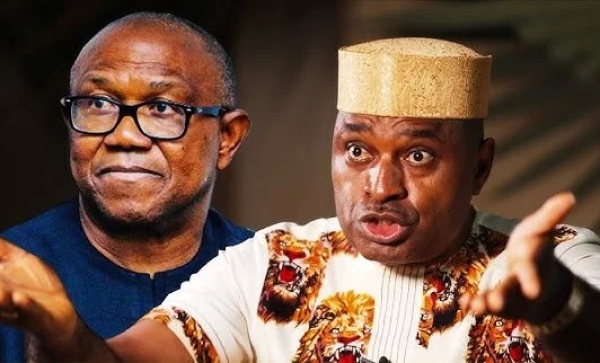A legal practitioner and former spokesperson for the Labour Party Presidential Campaign Council, Kenneth Okonkwo, has delivered a scathing assessment of former presidential candidate Peter Obi’s political trajectory, asserting that Obi is “committing political suicide” rather than being a victim of betrayal.
Okonkwo revealed this during an interview with Symfoni TV on Friday, claiming that Obi’s current political challenges stem from his own actions and an alleged lack of strategic foresight.
Okonkwo also dismissed the notion that external forces are undermining Obi’s political career.
“When he said that somebody betrayed him, it is not true. Obi is the one betraying himself,” Okonkwo stated emphatically.
He elaborated, asserting that “Nobody is murdering Obi’s political career. Obi is committing political suicide,” a strong condemnation of what he perceives as self-inflicted wounds.
Okonkwo further challenged the idea that a seasoned politician could be genuinely betrayed, suggesting that true political acumen guards against such occurrences.
“Any politician that knows what he’s doing cannot be betrayed by anybody,” Okonkwo posited, implying that Obi’s struggles highlight a deficiency in his political management.
In a surprising twist, he added, “If there is anybody that betrayed the other, I can say it emphatically, that Peter Obi betrayed me.”
Okonkwo pointed to what he described as Obi’s inadequacy as a “team player” and “great manager of political issues.”
He argued that Obi is externalising problems that are fundamentally internal. “You’re looking for your problem outside you,” Okonkwo lamented, indicating a deep-seated critique of Obi’s leadership style within the political landscape.
He contended that Obi’s decision to align with the Labour Party significantly altered his political destiny, placing it beyond his sole control.
“I told him that whatever happens, the Labour Party has happened to his political career,” Okonkwo recalled, highlighting a crucial conversation he had with the former governor.
He stressed that “anytime you’re stepping out into a coalition, the destiny of your political future is no longer in your hands.”
According to Okonkwo, this is because a politician in a coalition “have to subordinate your own interest to the interest of the coalition.”
He declared that “Labour Party is not viable now as a party to post a good presidential campaign,” suggesting that Obi’s path to 2027 success hinges entirely on a robust coalition, or he risks having “no impact whatsoever.”
Okonkwo cited specific instances where he believes Obi demonstrated a lack of loyalty to the Labour Party’s internal structures and candidates.
He recounted his efforts to promote party discipline, stating, “I went to the national office when I saw their mindset and pleaded with every member of Labour Party that nobody should campaign or endorse any candidate who is not a member of Labour Party.”
He contrasted this with Obi’s alleged actions, claiming that Obi publicly endorsed candidates from other political parties.
“The gubernatorial candidate of another party was who Obi endorsed in Cross River State, rather than the Labour Party gubernatorial candidate. Publicly,” Okonkwo revealed, underscoring what he saw as a clear act of internal inconsistency.
Okonkwo dismissed the idea that Obi is now a victim of government machinations, suggesting it’s a narrative Obi is creating.
He claimed that Obi is “in cahoots” with elements within the Labour Party leadership, especially concerning primary elections.
“In all the primaries that they have organised, none was organised without Obi’s approval,” Okonkwo asserted, citing examples from Edo, Ondo, and Anambra states.


